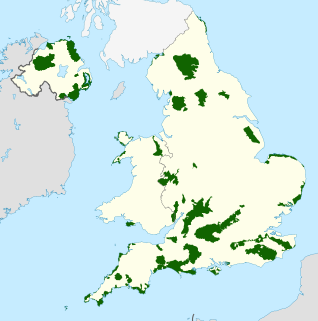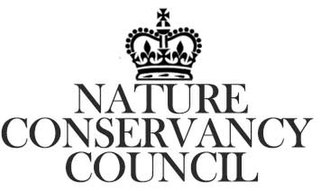
The Countryside Agency was a statutory body set up in England in 1999 with the task of improving the quality of the rural environment and the lives of those living in it. The agency was dissolved in 2006 and its functions dispersed among other bodies.

A Site of Special Scientific Interest (SSSI) in Great Britain or an Area of Special Scientific Interest (ASSI) in the Isle of Man and Northern Ireland is a conservation designation denoting a protected area in the United Kingdom and Isle of Man. SSSI/ASSIs are the basic building block of site-based nature conservation legislation and most other legal nature/geological conservation designations in the United Kingdom are based upon them, including national nature reserves, Ramsar sites, Special Protection Areas, and Special Areas of Conservation. The acronym "SSSI" is often pronounced "triple-S I".
This page gives an overview of the complex structure of environmental and cultural conservation in the United Kingdom.

NatureScot, which was formerly known as Scottish Natural Heritage, is an executive non-departmental public body of the Scottish Government responsible for the country's natural heritage, especially its natural, genetic and scenic diversity. It advises the Scottish Government on nature conservation, and acts as a government agent in the delivery of conservation designations, i.e. national nature reserves, local nature reserves, national parks, Sites of Special Scientific Interest (SSSIs), Special Areas of Conservation, Special Protection Areas and the national scenic areas. It receives annual funding from the Government in the form of Grant in Aid to deliver Government priorities for the natural heritage.

Some statutory nature reserves are designated by national bodies in the United Kingdom, and are known as national nature reserves.

The Countryside Council for Wales was a Welsh Assembly sponsored body responsible for wildlife conservation, landscape and countryside access authority for Wales. It was merged with Forestry Commission Wales, and Environment Agency Wales to form Natural Resources Wales, a single body managing Wales' environment and natural resources, on 1 April 2013.
The Northern Ireland Environment Agency (NIEA) is an executive agency within the Department of Agriculture, Environment and Rural Affairs (DAERA). It is responsible for conservation of Northern Ireland's environment and natural heritage.

An Area of Outstanding Natural Beauty is an area of countryside in England, Wales, and Northern Ireland, that has been designated for conservation due to its significant landscape value. Areas are designated in recognition of their national importance by the relevant public body: Natural England, Natural Resources Wales, and the Northern Ireland Environment Agency respectively. In place of AONB, Scotland uses the similar national scenic area (NSA) designation. Areas of Outstanding Natural Beauty enjoy levels of protection from development similar to those of UK national parks, but unlike national parks the responsible bodies do not have their own planning powers. They also differ from national parks in their more limited opportunities for extensive outdoor recreation.

The Wildlife and Countryside Act 1981 is an Act of Parliament in the United Kingdom implemented to comply with European Council Directive 79/409/EEC on the conservation of wild birds. In short, the act gives protection to native species, controls the release of non-native species, enhances the protection of Sites of Special Scientific Interest and builds upon the rights of way rules in the National Parks and Access to the Countryside Act 1949. The Act is split into 4 parts covering 74 sections; it also includes 17 schedules.

The Department for Environment, Food and Rural Affairs (Defra) is a department of His Majesty's Government responsible for environmental protection, food production and standards, agriculture, fisheries and rural communities in the United Kingdom. Concordats set out agreed frameworks for co operation, between it and the Scottish Government, Welsh Government and Northern Ireland Executive, which have devolved responsibilities for these matters in their respective nations.
The Countryside Commission was a statutory body in England and Wales, and later in England only. Its forerunner, the National Parks Commission, was established in 1949 by the National Parks and Access to the Countryside Act 1949 to co-ordinate government activity in relation to National Parks.

The National Parks and Access to the Countryside Act 1949 is an Act of the Parliament of the United Kingdom which created the National Parks Commission which later became the Countryside Commission and then the Countryside Agency, which became Natural England when it merged with English Nature in 2006. The Act provided the framework for the creation of National Parks and Areas of Outstanding Natural Beauty in England and Wales, and also addressed public rights of way and access to open land. The Act was passed in 1949 with all-party support, as part of the reconstruction of the UK by the Labour government after World War II.
The Joint Nature Conservation Committee (JNCC) is the public body that advises the UK Government and devolved administrations on UK-wide and international nature conservation.

The Nature Conservancy Council (NCC) was a United Kingdom government agency responsible for designating and managing National Nature Reserves and other nature conservation areas in Great Britain between 1973 and 1991.
The Nature Conservancy was a British government agency established in 1949 under the National Parks and Access to the Countryside Act 1949, drafted in part by Max Nicholson. It was a research council for natural sciences and 'biological service'. This provided legal protection of national nature reserves and Sites of Special Scientific Interest (SSSI).
The Geological Conservation Review (GCR) is produced by the UK's Joint Nature Conservation Committee and is designed to identify those sites of national and international importance needed to show all the key scientific elements of the geological and geomorphological features of Britain. These sites display sediments, rocks, minerals, fossils, and features of the landscape that make a special contribution to an understanding and appreciation of Earth science and the geological history of Britain, which stretches back more than three billion years. The intention of the project, which was devised in 1974 by George Black and William Wimbledon working for the Governmental advisory agency, the Nature Conservancy Council (NCC), was activated in 1977. It aimed to provide the scientific rationale and information base for the conservation of geological SSSIs (Sites of Special Scientific Interest, protected under British law. The NCC and country conservation agencies were established in 1990 when JNCC became established and took over responsibility for managing the GCR site assessment process, and publishing accounts of accepted sites.

Scotland occupies the northern part of the United Kingdom. The landscape is diverse; ranging from rugged mountain terrain to arable flat land with many rivers and lochs.

The Natural Environment and Rural Communities Act 2006, also referred to as the NERC Act (2006), is an Act of the Parliament of the United Kingdom. In a reorganisation of public bodies involved in rural policy and delivery, the measures dissolved English Nature, the Countryside Agency and the Rural Development Service, and established Natural England.

A Marine Conservation Zone (MCZ) is a type of marine nature reserve in UK waters. They were established under the Marine and Coastal Access Act (2009) and are areas designated with the aim to protect nationally important, rare or threatened habitats and species. Approximately 20% of UK waters now have some protection although some conservation, fisherman and wildlife groups are concerned that there are no management plans for each zone.












